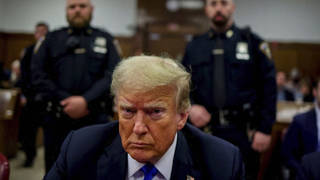
Guests
- Paul Masonjournalist and filmmaker. His recent opinion piece for The Guardian is called, “Corbyn delivered the Labour vote for remain—so let’s get behind him.” Mason’s new book is titled Postcapitalism: A Guide to Our Future.
Global stock markets have plummeted in the days since Britain voted to leave the European Union. More than $2 trillion was wiped off global equity markets on Friday in the biggest daily loss ever. Earlier today, the British pound hit a 31-year low. On Friday, Republican presidential candidate Donald Trump spoke in Scotland at the Trump Turnberry golf course. He celebrated the Brexit vote. “When the pound goes down, more people are coming to Turnberry, frankly,” Trump said.
Transcript
AMY GOODMAN: I wanted to ask you about Trump’s visit to Scotland to push his two golf courses. He has banned your colleague—right?—Ewen MacAskill of The Guardian.
PAUL MASON: Yeah.
AMY GOODMAN: Ewen MacAskill and his photographer—Ewen MacAskill is known for also interviewing Ed Snowden when he was in Hong Kong.
PAUL MASON: Ed Snowden, yeah.
AMY GOODMAN: And also his response to the Brexit vote, where he faced a barrage of protests and a boycott by a series of politicians, including Scotland’s first minister.
PAUL MASON: Yeah, yeah.
AMY GOODMAN: Trump commented on the Brexit vote during a news conference at his Trump Turnberry golf resort.
DONALD TRUMP: Nobody knows. Look, if the pound goes down, they’re going to do more business. You know, when the pound goes down, more people are coming to Turnberry, frankly. And the pound has gone down. And let’s see what the impact of that has. But I think places like Scotland and England and different places in Great Britain, I think you’re going to see a lot of—a lot of activity.
AMY GOODMAN: So there you have it, Donald Trump saying what’s—with the pound going down, that would be good for his golf course. Can you respond to—
PAUL MASON: His visit has just been relentless comedy, I’m afraid. And any of your viewers who are thinking that this man might become the president of the United States need to really worry, because he arrived and said, “What a great result. The people have got their way, to leave,” but he’s in Scotland. Scotland voted to remain. And Scotland will probably now leave the United Kingdom.
And as for what he said there about the pound falling being a good thing, well, if we were an export-driven economy and we had an industry left—Margaret Thatcher, unfortunately, destroyed our industry—that might be true. But we are largely an importing economy and a service-driven economy, which can only really carry on with our own current economic model, the finance-driven, financial services-driven model, if we remain part of Europe. You know, what’s threatening the share price of major British banks right now is the fear that they will lose their ability to trade in Europe. So, Trump is just completely wrong, and also crass, I think, in the way that he’s kind of blundered in here. And, I mean, remember Sarah Palin in the 2008 referendum—election in the United States, didn’t—you know, didn’t know much about the rest of the world, couldn’t—you know, really couldn’t tell you much about, for example, Russia. This guy has come into our country and gone to the very place and said the very opposite thing compared to reality.
And, you know, I think, quite right, no major politician has met him, because he’s not only toxic, he’s seen here as a racist. And we have a Muslim mayor of the city I’m sitting in, and a Muslim mayor who, under Trump’s proposals, would not be able to visit the United States.
AMY GOODMAN: How does Trump supporters compare to those in the Britain First movement in Britain who were pushing for Brexit?
PAUL MASON: The Britain First movement is a tiny fascist group which wears uniforms, like these people that have been perpetrating crimes today in the United States. They are a ultra-rightist, almost Ku Klux Klan-like group. That is one thing. The leave campaign, 52 percent of people voted leave, look, this is way broader than Trump. United Kingdom Independence Party, which is this party that has one member of Parliament but is very influential, they are more like the tea party. But I have to say that what we have in Britain, you know, there are some extreme social conservatives who, for example, would want to ban abortion, and have very reactionary and racist views on ethnic minorities, but really they are a much smaller minority, and therefore even the people who wanted a hard exit from Europe and don’t want migration, they are very careful about using any kind of language that’s racist. It’s often what we call dog-whistle racism. But I would say, look, the 52 percent vote to leave is not the equivalent as if Trump got 52 percent in the election. It’s way, way more broader than that.
AMY GOODMAN: Well, Paul Mason, I want to thank you for being with us, journalist and filmmaker. His recent opinion piece for The Guardian is headlined “Corbyn delivered the Labour vote for remain—so let’s get behind him.” Mason’s new book is Postcapitalism: A Guide to Our Future.
This is Democracy Now! When we come back, Mother Jones has devoted its whole next issue to an undercover investigation of a Louisiana for-profit prison run by the Corrections Corporation of America. An unusual independent journalist went undercover there. His name is Shane Bauer. You may know his name because he was in a prison. Well, he was imprisoned in Iran for two years. And now he’s come back to serve as a prison guard to investigate the prison. Stay with us.
[break]
AMY GOODMAN: “Between the Wars” by Billy Bragg. You can go to democracynow.org to see our interviews with the British rocker. This is Democracy Now!, democracynow.org, The War and Peace Report. I’m Amy Goodman.












Media Options